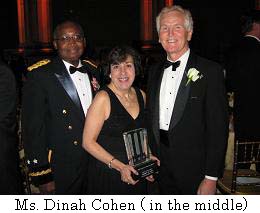
Ms. Dinah F. B. Cohen, Director of Computer/Electronic Accommodations Program (CAP), receives the 2007 Citizen Services Medal.
Ms. Dinah Cohen, the director of Computer/Electronic Accommodations Program (CAP), received the 2007 Citizen Services Medal for her excellent contribution to federal civil service. As a Japanese counterpart of CAP, we would like to celebrate the special achievement of Ms. Cohen and CAP. Congratulations!
The following is an article about Ms Cohen's achievement from the website Partnership for Public Service.
2007 Citizen Services Medal Recipient
This medal recognizes a federal employee for a significant contribution to the nation in activities related to social services (including economic development and assistance, education, health care, housing, labor, and transportation).

Dinah F. B. Cohen
Position: Director, Computer/Electronic Accommodations Program (CAP)
Agency: U.S. Department of Defense, TRICARE Management Activity
Location: Falls Church, Virginia
Achievement: Leads the world's largest assistive technology program, filling more than 60,000 accommodation requests for people with disabilities, including 2,400 accommodations for wounded service members.
Dinah Cohen knows more than a little something about overcoming adversity. She is the daughter of Holocaust survivors, and she was diagnosed with congenital heart disease when she was a young girl. Her life experience clearly prepared her well to lead the Department of Defense's program to help its employees with disabilities thrive in the workplace. Under her leadership, the Computer/Electronic Accommodations Program (CAP) has filled more than 60,000 requests — making it the world's largest assistive technology program — enabling persons with disabilities to lead more productive, fulfilling lives.
CAP levels the playing field for people with disabilities by providing assistive technology and services free of charge to federal managers. More specifically, CAP buys, pays for and delivers the hardware, software and services people with disabilities need to function in the workplace. This assistive technology helps workers access telecommunications, computers and electronic information and ranges from Braille terminals to specialized keyboards for people who cannot use conventional ones. These resources allow individuals with disabilities to compete in the workplace by eliminating cost and nuisance factors that have been prohibitive of employment in the past. The program has proven to be wildly popular, earning 95 percent customer satisfaction ratings.
CAP is as much a resource for federal managers as it is for workers with disabilities. Cohen opened the CAP Technology Evaluation Center as an assessment and demonstration facility in the Pentagon. This facility is a resource for senior federal leaders, managers and employees to see the power of assistive technology. It has hosted demonstrations, training and assessments for more than 20,000 visitors to see the range of technology and services that are available for individuals with disabilities. It is so widely recognized as one of the most effective ways our government helps its workers with disabilities that President Bush visited the facility in June 2001.
Under Dinah Cohen's leadership, one of the organizing principles of the program has been to always keep moving forward and keep looking for ways to do more. Cohen has always lived up to this creed.
In 2000, CAP was granted the authority to provide assistive technology and services to any federal employee. Since that time, Cohen has established partnerships with 65 agencies outside of DoD. The most notable new expansion of the program was to work with wounded service members returning from Iraq and Afghanistan. CAP was not originally intended to serve service members who were disabled in combat, but Cohen saw this as a logical extension for the program. With a background as a rehabilitation counselor, she spent a lot of time in military hospitals where she met service members returning from Iraq and Afghanistan with debilitating injuries. It was obvious to her that CAP had the tools they would need to re-enter the workforce. She wanted to help these young men and women transition from deployment to employment, so she took action. As Cohen said, "There was nothing that said I couldn't give them the assistive technology, since they are DoD employees. So I did."
However, she did have to make one change to the rules. The law said the DoD would have to take the equipment back after these service members left the military. Clearly, this made no sense, so Cohen, with senior leadership, lobbied Congress to change the law and succeeded. As of spring 2007, CAP had filled more than 2,400 requests for assistive technology for wounded service members, bringing the total number of services from CAP since its inception to more than 57,000.
Dinah Cohen didn't just lead a program that has had a transformative impact on the lives of tens of thousands of people, she built it. She was CAP's first director, getting hired in 1990. As emotionally taxing as her line of work can be, the odds say she should have moved onto another challenge by now. But Dinah Cohen's whole life has been about beating the odds, and she will continue to do so and help others to do so as long as she's heading the Computer/Electronic Accommodations Program. |




